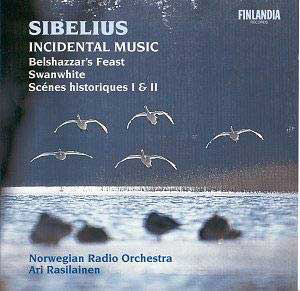Though he never became an operatic composer (completing
only one short, minor work, The Maiden in the Tower in 1896),
Sibelius was always drawn to the stage, and wrote incidental theatre
music throughout his composing life. The works assembled on this enterprising
disc show a mix of relatively familiar fare with some neglected items,
and the whole thing, whilst maybe not top-drawer Sibelius, is very enjoyable.
I suppose the most well known pieces will be the suites
entitled Scènes historiques (Historical Pictures),
which have been recorded a number of times. The first set was inspired
by a series of tableaux depicting aspects of Finlandís history,
and was turned into the concert suite we know today in 1911. This seems
to have prompted him to begin work on a second set in 1912, though this
is a wholly original composition, using for its inspiration Finnish
folkloric tales. On the whole I prefer this second set, which has at
times echoes of both the Third and Sixth Symphonies, especially
the opening movement, entitled The Chase. This is extremely vivid
picture painting, and Sibelius seems to revel in having an image of
magic forests and exciting hunts to portray in music. The final section,
called At the Draw-bridge (and inviting obvious comparison with
At the Castle Gate), is a moving and powerful conclusion, full
of atmosphere. I like Ari Rasilainenís pacing here, and though generally
throughout the disc he errs on the steady side, this is no bad thing
in music of brooding nobility, as much of this is.
The music from Belshazzarís Feast was new to
me, though it has been recorded a few times, most recently by Neeme
Järvi, in his complete BIS cycle. I find it the least convincing
music on the disc, with the cod-orientalism sounding a bit cheap and
contrived. The third movement, entitled Night Music, sounds to
me the most successful, with evocative orchestration lending a more
genuine atmosphere; the beautiful solo flute playing of Tom Andreassen
must be mentioned here as adding to the enjoyment.
The great discovery for me (though again, it has been
recorded on BIS and Ondine), was the music for Strindbergís late Symbolist
fantasy play, Swanwhite. Sibelius and Strindberg were great mutual
admirers, and the original score, which ran to fourteen musical numbers,
dates from 1908. Later in that year, Sibelius adapted a seven-movement
suite from the material, and this follows the action pretty faithfully.
This is marvellous stuff, full of Sibelian thumbprints; the long pedal
points over which woodwind detail (usually in thirds) can ethereally
float; the slow, rocking ostinatos that sound, in Robert Laytonís words
"like massive, swinging pendulums, timeless and full of foreboding".
The finale, entitled Song of Praise, may be the most luscious
piece of Sibelius Iíve heard in a while, positively Tchaikovskian in
its sweep and grandeur, and never sentimental.
The playing of the Norwegian Radio Orchestra is mostly
excellent, with solo wind playing well characterised, and strings reasonably
full and resonant, though it does make me hanker to hear the Berlin
or Vienna Phil. in some of this less well-known music. The conductor
(a name new to me) obviously has great sympathy and understanding of
the material, letting the great arched phrases unfold naturally. A more
fiery temperament would not have gone amiss in places, but on the whole
this is very satisfying music making. The recorded sound is glorious,
wide-ranging and detailed, with an ample acoustic and plenty of bloom.
So good is it, that Iím sure it makes the orchestra often sound better
than they are!
As Iíve pointed out, all this material has been recorded
by the specialist labels, but if this grouping of pieces (which is logical
and appropriate) appeals, donít hesitate.
Tony Haywood


![]() See
what else is on offer
See
what else is on offer 